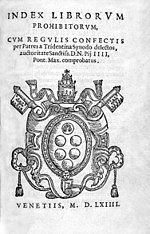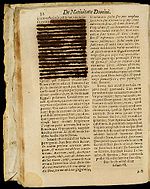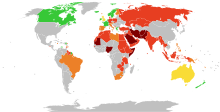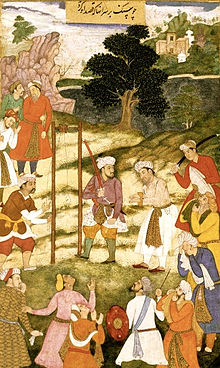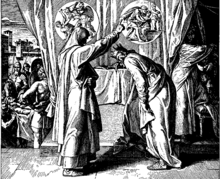Eleanor Roosevelt and the Universal Declaration of Human Rights
(1949)—Article 19 states that "Everyone has the right to freedom of
opinion and expression; this right includes freedom to hold opinions
without interference and to seek, receive and impart information and
ideas through any media and regardless of frontiers"
Orator at Speakers' Corner in London, 1974
Freedom of speech is a principle that supports the freedom of an individual or a community to articulate their opinions and ideas without fear of retaliation, censorship, or legal sanction. The term "freedom of expression"
is sometimes used synonymously but includes any act of seeking,
receiving, and imparting information or ideas, regardless of the medium
used.
Freedom of expression is recognized as a human right under article 19 of the Universal Declaration of Human Rights (UDHR) and recognized in international human rights law in the International Covenant on Civil and Political Rights
(ICCPR). Article 19 of the UDHR states that "everyone shall have the
right to hold opinions without interference" and "everyone shall have
the right to freedom of expression; this right shall include freedom to
seek, receive and impart information and ideas of all kinds, regardless
of frontiers, either orally, in writing or in print, in the form of art,
or through any other media of his choice". The version of Article 19 in
the ICCPR later amends this by stating that the exercise of these
rights carries "special duties and responsibilities" and may "therefore
be subject to certain restrictions" when necessary "[f]or respect of the
rights or reputation of others" or "[f]or the protection of national
security or of public order (order public), or of public health or
morals".
Freedom of speech and expression, therefore, may not be
recognized as being absolute, and common limitations or boundaries to
freedom of speech relate to libel, slander, obscenity, pornography, sedition, incitement, fighting words, classified information, copyright violation, trade secrets, food labeling, non-disclosure agreements, the right to privacy, the right to be forgotten, public security, and perjury. Justifications for such include the harm principle, proposed by John Stuart Mill in On Liberty,
which suggests that: "the only purpose for which power can be
rightfully exercised over any member of a civilized community, against
his will, is to prevent harm to others."
The idea of the "offense principle" is also used in the
justification of speech limitations, describing the restriction on forms
of expression deemed offensive to society, considering factors such as
extent, duration, motives of the speaker, and ease with which it could
be avoided. With the evolution of the digital age,
application of the freedom of speech becomes more controversial as new
means of communication and restrictions arise, for example the Golden Shield Project, an initiative by Chinese government's Ministry of Public Security that filters potentially unfavorable data from foreign countries.
Origins
Freedom of speech and expression has a long history that predates modern international human rights instruments. It is thought that ancient Athenian democratic principle of free speech may have emerged in the late 6th or early 5th century BC. The values of the Roman Republic included freedom of speech and freedom of religion.
Concepts of freedom of speech can be found in early human rights documents. The Declaration of the Rights of Man and of the Citizen, adopted during the French Revolution in 1789, specifically affirmed freedom of speech as an inalienable right. The Declaration provides for freedom of expression in Article 11, which states that:
The free communication of ideas and opinions is one of the most precious of the rights of man. Every citizen may, accordingly, speak, write, and print with freedom, but shall be responsible for such abuses of this freedom as shall be defined by law.
Article 19 of the Universal Declaration of Human Rights, adopted in 1948, states that:
Everyone has the right to freedom of opinion and expression; this right includes freedom to hold opinions without interference and to seek, receive and impart information and ideas through any media and regardless of frontiers.
Today, freedom of speech, or the freedom of expression, is recognized in international and regional human rights law. The right is enshrined in Article 19 of the International Covenant on Civil and Political Rights, Article 10 of the European Convention on Human Rights, Article 13 of the American Convention on Human Rights and Article 9 of the African Charter on Human and Peoples' Rights. Based on John Milton's
arguments, freedom of speech is understood as a multi-faceted right
that includes not only the right to express, or disseminate, information
and ideas, but three further distinct aspects:
- the right to seek information and ideas;
- the right to receive information and ideas;
- the right to impart information and ideas
International, regional and national standards also recognize that
freedom of speech, as the freedom of expression, includes any medium, be
it orally, in written, in print, through the Internet
or through art forms. This means that the protection of freedom of
speech as a right includes not only the content, but also the means of
expression.
Relationship to other rights
The
right to freedom of speech and expression is closely related to other
rights, and may be limited when conflicting with other rights (see limitations on freedom of speech). The right to freedom of expression is also related to the right to a fair trial
and court proceeding which may limit access to the search for
information, or determine the opportunity and means in which freedom of
expression is manifested within court proceedings. As a general principle freedom of expression may not limit the right to privacy, as well as the honor and reputation of others. However greater latitude is given when criticism of public figures is involved.
The right to freedom of expression is particularly important for media, which plays a special role as the bearer of the general right to freedom of expression for all. However, freedom of the press
does not necessarily enable freedom of speech. Judith Lichtenberg has
outlined conditions in which freedom of the press may constrain freedom
of speech, for example where the media suppresses information or stifles
the diversity of voices inherent in freedom of speech. Lichtenberg
argues that freedom of the press is simply a form of property right summed up by the principle "no money, no voice".
Democracy and social interaction
Permanent Free Speech Wall in Charlottesville, Virginia, U.S.
Freedom of speech is understood to be fundamental in a democracy. The
norms on limiting freedom of expression mean that public debate may not
be completely suppressed even in times of emergency. One of the most notable proponents of the link between freedom of speech and democracy is Alexander Meiklejohn.
He has argued that the concept of democracy is that of self-government
by the people. For such a system to work, an informed electorate is
necessary. In order to be appropriately knowledgeable, there must be no
constraints on the free flow of information and ideas. According to
Meiklejohn, democracy will not be true to its essential ideal if those
in power are able to manipulate the electorate by withholding
information and stifling criticism. Meiklejohn acknowledges that the
desire to manipulate opinion can stem from the motive of seeking to
benefit society. However, he argues, choosing manipulation negates, in
its means, the democratic ideal.
Eric Barendt
has called this defense of free speech on the grounds of democracy
"probably the most attractive and certainly the most fashionable free
speech theory in modern Western democracies".
Thomas I. Emerson expanded on this defense when he argued that freedom
of speech helps to provide a balance between stability and change. Freedom of speech acts as a "safety valve" to let off steam when people might otherwise be bent on revolution.
He argues that "The principle of open discussion is a method of
achieving a more adaptable and at the same time more stable community,
of maintaining the precarious balance between healthy cleavage and
necessary consensus." Emerson furthermore maintains that "Opposition
serves a vital social function in offsetting or ameliorating (the)
normal process of bureaucratic decay."
Research undertaken by the Worldwide Governance Indicators project at the World Bank,
indicates that freedom of speech, and the process of accountability
that follows it, have a significant impact in the quality of governance of a country. "Voice and Accountability" within a country, defined as "the extent to which a country's citizens are able to participate in selecting their government, as well as freedom of expression, freedom of association, and free media" is one of the six dimensions of governance that the Worldwide Governance Indicators measure for more than 200 countries.
Against this backdrop it is important that development agencies create
grounds for effective support for a free press in developing countries.
Richard Moon has developed the argument that the value of freedom
of speech and freedom of expression lies with social interactions. Moon
writes that "by communicating an individual forms relationships and
associations with others – family, friends, co-workers, church
congregation, and countrymen. By entering into discussion with others an
individual participates in the development of knowledge and in the
direction of the community."
Limitations
Members of Westboro Baptist Church (pictured in 2006) have been specifically banned from entering Canada for hate speech.
Countries with laws against Holocaust denial
Legal systems sometimes recognize certain limits on or to the freedom
of speech, particularly when freedom of speech conflicts with other
rights and freedoms, such as in the cases of libel, slander, pornography, obscenity, fighting words, and intellectual property. In Europe, blasphemy is a limitation to free speech. Justifications for limitations to freedom of speech often reference the "harm principle" or the "offense principle". Limitations to freedom of speech may occur through legal sanction or social disapprobation, or both. Certain public institutions may also enact policies restricting the freedom of speech, for example speech codes at state schools.
In On Liberty (1859), John Stuart Mill
argued that "...there ought to exist the fullest liberty of professing
and discussing, as a matter of ethical conviction, any doctrine, however
immoral it may be considered."
Mill argues that the fullest liberty of expression is required to push
arguments to their logical limits, rather than the limits of social
embarrassment.
However, Mill also introduced what is known as the harm principle, in
placing the following limitation on free expression: "the only purpose
for which power can be rightfully exercised over any member of a
civilized community, against his will, is to prevent harm to others."
In 1985, Joel Feinberg
introduced what is known as the "offense principle", arguing that
Mill's harm principle does not provide sufficient protection against the
wrongful behaviors of others. Feinberg wrote "It is always a good
reason in support of a proposed criminal prohibition that it would
probably be an effective way of preventing serious offense (as opposed
to injury or harm) to persons other than the actor, and that it is
probably a necessary means to that end."
Hence Feinberg argues that the harm principle sets the bar too high and
that some forms of expression can be legitimately prohibited by law
because they are very offensive. But, as offending someone is less
serious than harming someone, the penalties imposed should be higher for
causing harm. In contrast, Mill does not support legal penalties unless they are based on the harm principle.
Because the degree to which people may take offense varies, or may be
the result of unjustified prejudice, Feinberg suggests that a number of
factors need to be taken into account when applying the offense
principle, including: the extent, duration and social value of the
speech, the ease with which it can be avoided, the motives of the
speaker, the number of people offended, the intensity of the offense,
and the general interest of the community at large.
Along similar lines as Mill, Jasper Doomen argued that harm
should be defined from the point of view of the individual citizen, not
limiting harm to physical harm since nonphysical harm may also be
involved; Feinberg's distinction between harm and offense is criticized
as largely trivial.
In 1999, Bernard Harcourt
wrote of the collapse of the harm principle: "Today the debate is
characterized by a cacophony of competing harm arguments without any way
to resolve them. There is no longer an argument within the structure of
the debate to resolve the competing claims of harm. The original harm
principle was never equipped to determine the relative importance of
harms."
Interpretations of both the harm and offense limitations to
freedom of speech are culturally and politically relative. For instance,
in Russia, the harm and offense principles have been used to justify
the Russian LGBT propaganda law restricting speech (and action) in relation to LGBT
issues. A number of European countries that take pride in freedom of
speech nevertheless outlaw speech that might be interpreted as Holocaust denial.
These include Austria, Belgium, Canada, the Czech Republic, France,
Germany, Hungary, Israel, Liechtenstein, Lithuania, Luxembourg,
Netherlands, Poland, Portugal, Slovakia, Switzerland and Romania. Armenian Genocide denial is also illegal in some countries.
In the U.S., the standing landmark opinion on political speech is Brandenburg v. Ohio (1969), expressly overruling Whitney v. California. In Brandenburg, the US Supreme Court referred to the right even to speak openly of violent action and revolution in broad terms:
[Our] decisions have fashioned the principle that the constitutional guarantees of free speech and free press do not allow a State to forbid or proscribe advocacy of the use of force or law violation except where such advocacy is directed to inciting or producing imminent lawless action and is likely to incite or cause such action.
The opinion in Brandenburg discarded the
previous test of "clear and present danger" and made the right to
freedom of (political) speech's protections in the United States almost
absolute. Hate speech is also protected by the First Amendment in the United States, as decided in R.A.V. v. City of St. Paul, (1992) in which the Supreme Court ruled that hate speech is permissible, except in the case of imminent violence.
The Internet and information society
The Free Speech Flag was created during the AACS encryption key controversy as "a symbol to show support for personal freedoms."
Jo Glanville, editor of the Index on Censorship, states that "the Internet has been a revolution for censorship as much as for free speech".
International, national and regional standards recognise that freedom
of speech, as one form of freedom of expression, applies to any medium,
including the Internet. The Communications Decency Act (CDA) of 1996 was the first major attempt by the United States Congress to regulate pornographic material on the Internet. In 1997, in the landmark cyberlaw case of Reno v. ACLU, the US Supreme Court partially overturned the law. Judge Stewart R. Dalzell,
one of the three federal judges who in June 1996 declared parts of the
CDA unconstitutional, in his opinion stated the following:
The Internet is a far more speech-enhancing medium than print, the village green, or the mails. Because it would necessarily affect the Internet itself, the CDA would necessarily reduce the speech available for adults on the medium. This is a constitutionally intolerable result. Some of the dialogue on the Internet surely tests the limits of conventional discourse. Speech on the Internet can be unfiltered, unpolished, and unconventional, even emotionally charged, sexually explicit, and vulgar – in a word, "indecent" in many communities. But we should expect such speech to occur in a medium in which citizens from all walks of life have a voice. We should also protect the autonomy that such a medium confers to ordinary people as well as media magnates.[...] My analysis does not deprive the Government of all means of protecting children from the dangers of Internet communication. The Government can continue to protect children from pornography on the Internet through vigorous enforcement of existing laws criminalizing obscenity and child pornography. [...] As we learned at the hearing, there is also a compelling need for public educations about the benefits and dangers of this new medium, and the Government can fill that role as well. In my view, our action today should only mean that Government's permissible supervision of Internet contents stops at the traditional line of unprotected speech. [...] The absence of governmental regulation of Internet content has unquestionably produced a kind of chaos, but as one of the plaintiff's experts put it with such resonance at the hearing: "What achieved success was the very chaos that the Internet is. The strength of the Internet is chaos." Just as the strength of the Internet is chaos, so that strength of our liberty depends upon the chaos and cacophony of the unfettered speech the First Amendment protects.
The World Summit on the Information Society
(WSIS) Declaration of Principles adopted in 2003 makes specific
reference to the importance of the right to freedom of expression for
the "Information Society" in stating:
We reaffirm, as an essential foundation of the Information society, and as outlined in Article 19 of the Universal Declaration of Human Rights, that everyone has the right to freedom of opinion and expression; that this right includes freedom to hold opinions without interference and to seek, receive and impart information and ideas through any media and regardless of frontiers. Communication is a fundamental social process, a basic human need and the foundation of all social organisation. It is central to the Information Society. Everyone, everywhere should have the opportunity to participate and no one should be excluded from the benefits of the Information Society offers.
According to Bernt Hugenholtz and Lucie Guibault the public domain is under pressure from the "commodification
of information" as information with previously little or no economic
value has acquired independent economic value in the information age.
This includes factual data, personal data, genetic information and pure ideas. The commodification of information is taking place through intellectual property law, contract law, as well as broadcasting and telecommunications law.
The internet and freedom of speech have been in the spotlight
quite often recently. With the removal of Alex Jones from Facebook and
YouTube, questions are being raised about freedom of speech rights and
how those liberties apply to the internet.
Freedom of information
Freedom of information is an extension of freedom of speech where the medium of expression is the Internet. Freedom of information may also refer to the right to privacy in the context of the Internet and information technology. As with the right to freedom of expression, the right to privacy is a recognised human right and freedom of information acts as an extension to this right. Freedom of information may also concern censorship in an information technology context, i.e. the ability to access Web content, without censorship or restrictions.
Freedom of information is also explicitly protected by acts such
as the Freedom of Information and Protection of Privacy Act of Ontario,
in Canada.
Internet censorship
The concept of freedom of information
has emerged in response to state sponsored censorship, monitoring and
surveillance of the internet. Internet censorship includes the control
or suppression of the publishing or accessing of information on the
Internet. The Global Internet Freedom Consortium claims to remove blocks to the "free flow of information" for what they term "closed societies". According to the Reporters without Borders (RWB) "internet enemy list" the following states engage in pervasive internet censorship: China, Cuba, Iran, Myanmar/Burma, North Korea, Saudi Arabia, Syria, Turkmenistan, Uzbekistan, and Vietnam.
A widely publicized example of internet censorship is the "Great Firewall of China" (in reference both to its role as a network firewall and to the ancient Great Wall of China). The system blocks content by preventing IP addresses from being routed through and consists of standard firewall and proxy servers at the Internet gateways. The system also selectively engages in DNS poisoning
when particular sites are requested. The government does not appear to
be systematically examining Internet content, as this appears to be
technically impractical. Internet censorship in the People's Republic of China
is conducted under a wide variety of laws and administrative
regulations, including more than sixty regulations directed at the
Internet. Censorship systems are vigorously implemented by provincial
branches of state-owned ISPs, business companies, and organizations.
History of dissent and truth
Title page of Index Librorum Prohibitorum, or List of Prohibited Books, (Venice, 1564)
Before the invention of the printing press
a written work, once created, could only be physically multiplied by
highly laborious and error-prone manual copying. No elaborate system of
censorship and control over scribes
existed, who until the 14th century were restricted to religious
institutions, and their works rarely caused wider controversy. In
response to the printing press, and the heresies it allowed to spread, the Roman Catholic Church moved to impose censorship.
Printing allowed for multiple exact copies of a work, leading to a more
rapid and widespread circulation of ideas and information (see print culture). The origins of copyright law
in most European countries lie in efforts by the Roman Catholic Church
and governments to regulate and control the output of printers.
In Panegyricae orationes septem (1596), Henric van Cuyck, a Dutch Bishop, defended the need for censorship and argued that Johannes Gutenberg's printing press had resulted in a world infected by "pernicious lies"—so van Cuyck singled out the Talmud and the Qu’ran, and the writings of Martin Luther, Jean Calvin and Erasmus of Rotterdam.
In 1501 Pope Alexander VI issued a Bill against the unlicensed printing of books and in 1559 the Index Expurgatorius, or List of Prohibited Books, was issued for the first time.
The Index Expurgatorius is the most famous and long lasting example of
"bad books" catalogues issued by the Roman Catholic Church, which
presumed to be in authority over private thoughts and opinions, and
suppressed views that went against its doctrines. The Index
Expurgatorius was administered by the Roman Inquisition, but enforced by local government authorities, and went through 300 editions. Amongst others, it banned or censored books written by René Descartes, Giordano Bruno, Galileo Galilei, David Hume, John Locke, Daniel Defoe, Jean-Jacques Rousseau and Voltaire. While governments and church encouraged printing in many ways because it allowed for the dissemination of Bibles
and government information, works of dissent and criticism could also
circulate rapidly. As a consequence, governments established controls
over printers across Europe, requiring them to have official licenses to
trade and produce books.
First page of John Milton's 1644 edition of Areopagitica, in which he argued forcefully against the Licensing Order of 1643
The notion that the expression of dissent or subversive views should
be tolerated, not censured or punished by law, developed alongside the
rise of printing and the press. Areopagitica, published in 1644, was John Milton's response to the Parliament of England's re-introduction of government licensing of printers, hence publishers. Church authorities had previously ensured that Milton's essay on the right to divorce was refused a license for publication. In Areopagitica, published without a license, Milton made an impassioned plea for freedom of expression and toleration of falsehood, stating:
Give me the liberty to know, to utter, and to argue freely according to conscience, above all liberties.
This 1688 edition of Jacobus de Voragine's Golden Legend (1260) was censored according to the Index Librorum Expurgatorum of 1707, which listed the specific passages of books already in circulation that required censorship
Milton's defense of freedom of expression was grounded in a Protestant worldview and he thought that the English people had the mission to work out the truth of the Reformation, which would lead to the enlightenment
of all people. But Milton also articulated the main strands of future
discussions about freedom of expression. By defining the scope of
freedom of expression and of "harmful" speech Milton argued against the
principle of pre-censorship and in favor of tolerance for a wide range
of views.
Freedom of the press ceased being regulated in England in 1695 when the
Licensing Order of 1643 was allowed to expire after the introduction of
the Bill of Rights 1689 shortly after the Glorious Revolution. The emergence of publications like the Tatler (1709) and the Spectator
(1711) are given credit for creating a 'bourgeois public sphere' in
England that allowed for a free exchange of ideas and information.
As the "menace" of printing spread, more governments attempted to centralize control. The French crown repressed printing and the printer Etienne Dolet was burned at the stake in 1546. In 1557 the British Crown thought to stem the flow of seditious and heretical books by chartering the Stationers' Company. The right to print was limited to the members of that guild, and thirty years later the Star Chamber
was chartered to curtail the "greate enormities and abuses" of "dyvers
contentyous and disorderlye persons professinge the arte or mystere of
pryntinge or selling of books." The right to print was restricted to two
universities and to the 21 existing printers in the city of London, which had 53 printing presses. As the British crown took control of type founding in 1637 printers fled to the Netherlands.
Confrontation with authority made printers radical and rebellious, with
800 authors, printers and book dealers being incarcerated in the Bastille in Paris before it was stormed in 1789.
A succession of English thinkers was at the forefront of early discussion on a right to freedom of expression, among them John Milton (1608–74) and John Locke (1632–1704). Locke established the individual as the unit of value and the bearer of rights to life, liberty, property and the pursuit of happiness.
However Locke's ideas evolved primarily around the concept of the right
to seek salvation for one's soul, and was thus primarily concerned with
theological matters. Locke neither supported a universal toleration of
peoples nor freedom of speech; according to his ideas, some groups, such
as atheists, should not be allowed.
George Orwell statue at the headquarters of the BBC.
A defence of free speech in an open society, the wall behind the statue
is inscribed with the words "If liberty means anything at all, it means
the right to tell people what they do not want to hear”, words from George Orwell's proposed preface to Animal Farm (1945).
By the second half of the 17th century philosophers on the European continent like Baruch Spinoza and Pierre Bayle developed ideas encompassing a more universal aspect freedom of speech and toleration than the early English philosophers.
By the 18th century the idea of freedom of speech was being discussed
by thinkers all over the Western world, especially by French philosophes like Denis Diderot, Baron d'Holbach and Claude Adrien Helvétius.
The idea began to be incorporated in political theory both in theory as
well as practice; the first state edict in history proclaiming complete
freedom of speech was the one issued December 4, 1770 in Denmark-Norway during the regency of Johann Friedrich Struensee.
However Struensee himself imposed some minor limitations to this edict
in October 7, 1771, and it was even further limited after the fall of
Struensee with legislation introduced in 1773, although censorship was
not reintroduced.
John Stuart Mill
(1806–1873) argued that without human freedom there can be no progress
in science, law or politics, which according to Mill required free
discussion of opinion. Mill's On Liberty, published in 1859 became a classic defence of the right to freedom of expression. Mill argued that truth
drives out falsity, therefore the free expression of ideas, true or
false, should not be feared. Truth is not stable or fixed, but evolves
with time. Mill argued that much of what we once considered true has
turned out false. Therefore, views should not be prohibited for their
apparent falsity. Mill also argued that free discussion is necessary to
prevent the "deep slumber of a decided opinion". Discussion would drive
the onwards march of truth and by considering false views the basis of
true views could be re-affirmed.
Furthermore, Mill argued that an opinion only carries intrinsic value
to the owner of that opinion, thus silencing the expression of that
opinion is an injustice to a basic human right. For Mill, the only
instance in which speech can be justifiably suppressed is in order to
prevent harm from a clear and direct threat. Neither economic or moral
implications, nor the speakers own well-being would justify suppression
of speech.
In Evelyn Beatrice Hall's biography of Voltaire,
she coined the following sentence to illustrate Voltaire's beliefs: "I
disapprove of what you say, but I will defend to the death your right to
say it." Hall's quote is frequently cited to describe the principle of freedom of speech.
In the 20th Century, Noam Chomsky states that: "If you believe in
freedom of speech, you believe in freedom of speech for views you don't
like. Dictators such as Stalin and Hitler,
were in favor of freedom of speech for views they liked only. If you're
in favor of freedom of speech, that means you're in favor of freedom of
speech precisely for views you despise." Lee Bollinger
argues that "the free speech principle involves a special act of
carving out one area of social interaction for extraordinary
self-restraint, the purpose of which is to develop and demonstrate a
social capacity to control feelings evoked by a host of social
encounters." Bollinger argues that tolerance
is a desirable value, if not essential. However, critics argue that
society should be concerned by those who directly deny or advocate, for
example, genocide (see limitations above).
The 1928 novel Lady Chatterley's Lover by D. H. Lawrence was banned for obscenity
in a number of countries, including the United Kingdom, the United
States, Australia and Canada. In the late 1950s and early 1960s, it was
the subject of landmark court rulings which saw the ban for obscenity
overturned. Dominic Sandbrook of The Telegraph
in the UK wrote, "Now that public obscenity has become commonplace, it
is hard to recapture the atmosphere of a society that saw fit to ban
books such as Lady Chatterley’s Lover because it was likely to “deprave and corrupt” its readers." Fred Kaplan of The New York Times stated the overturning of the obscenity laws "set off an explosion of free speech" in the US.
The right to freedom of expression has been interpreted to
include the right to take and publish photographs of strangers in public
areas without their permission or knowledge.






